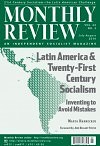Volume 62, Issue 03 (July-August)

For those wishing to understand the theory and practice of “socialism for the 21st century,” the publication this summer of Michael Lebowitz’s The Socialist Alternative: Real Human Development (Monthly Review Press) is a major event. Like Marta Harnecker, whose work, “Latin America and Twenty-First Century Socialism: Inventing to Avoid Mistakes,” forms the content of this issue of Monthly Review, Lebowitz is associated with the Centro Internacional Miranda research institute in Venezuela, is an advisor to President Hugo Chávez, and is a major Marxian theorist and political economist. He is also author of Beyond Capital: Marx’s Political Economy of the Working Class, and, more recently, Build it Now (Monthly Review Press, 2006) | more…
In the eyes of much of the world, the year 1989 has come to stand for the fall of the Berlin Wall, the demise of Soviet-type societies, and the defeat of twentieth-century socialism. However, 1989 for many others, particularly in Spanish-speaking countries, is also associated with the beginning of the Latin American revolt against neoliberal shock therapy and the emergence in the years that followed of a “socialism for the 21st century.” This revolutionary turning point in Latin American (and world) history is known as the Caracazo or Sacudón (heavy riot), which erupted in Caracas, Venezuela on February 27, 1989, and quickly became “by far the most massive and severely repressed riot in the history of Latin America.” | more…
Twenty years ago, left forces in Latin America and in the world in general were going through a difficult period. The Berlin Wall had fallen; the Soviet Union hurtled into an abyss and disappeared completely by the end of 1991. Deprived of the rearguard it needed, the Sandinista Revolution was defeated at the polls in February 1990, and Central American guerrilla movements were forced to demobilize. The only country that kept the banners of revolution flying was Cuba, although all the omens said that its days were numbered. Given that situation, it was difficult to imagine that twenty years later, left-wing leaders would govern most of the Latin American countries. | more…
Latin America was the first region in the world where neoliberal policies were introduced. Chile, my country, was used as a testing ground before Prime Minister Margaret Thatcher’s government implemented them in the United Kingdom. But Latin America was also the first region in the world where these policies came to be rejected as policies that only served to increase poverty, aggravate social inequalities, destroy the environment, and weaken working-class and popular movements in general.…It was in our subcontinent that left and progressive forces first began to rally after the collapse of socialism in Eastern Europe and the Soviet Union. After more than two decades of suffering, new hope was born. At first, this took the shape of struggles to resist neoliberal policies, but after a few years, people went on the offensive, conquering arenas of power. | more…
“Why talk of socialism?” we may ask. After all, “socialism” has had such negative connotations since its collapse in the Soviet Union and other Eastern European countries. For many years after Soviet socialism disappeared, intellectuals and progressive forces talked more of what socialism must not be than of the model that we actually wanted to build. Some of the facets of Soviet socialism that were rejected—and rightly so—were: statism, state capitalism, totalitarianism, bureaucratic central planning, the kind of collectivism that seeks to homogenize without respecting differences, productivism (which stresses the growth of productive forces without being concerned about the need to protect nature), dogmatism, atheism, and the need for a single party to lead the transition process. | more…
My reflections on the kind of political instrument needed to build twenty-first century socialism are intended to contribute to a larger body of thought about the horizon toward which a growing number of Latin American governments are moving. I conclude by emphasizing the need for a new left culture, a tolerant and pluralist culture that stresses that which unites us rather than that which divides us. A culture that promotes unity around values—such as solidarity, humanism, respect for difference, and protection of the environment—and turns its back on the view that hunger for profit and the laws of the market are the guiding principles of human activity. | more…
